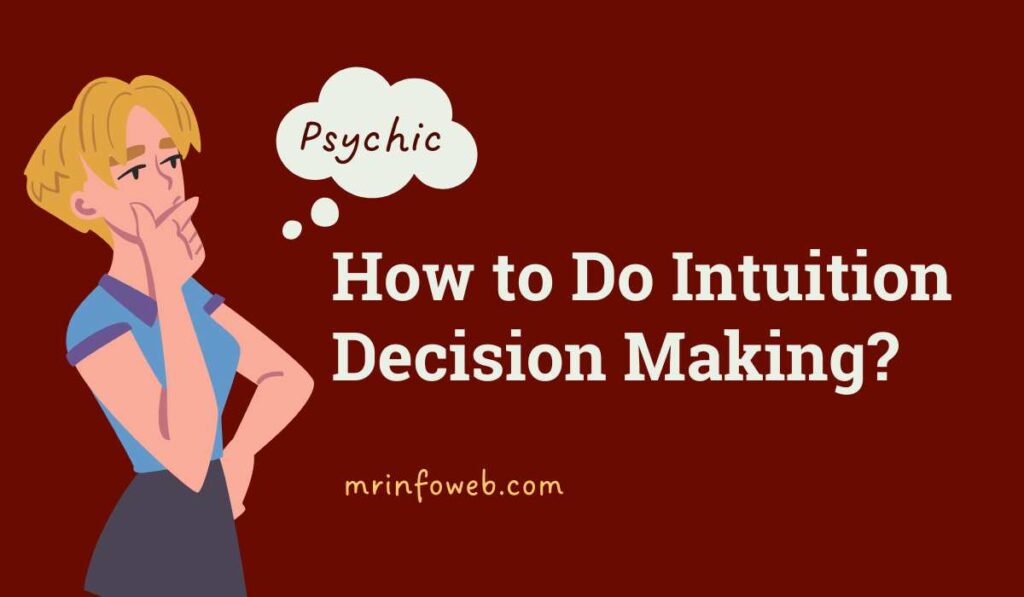Intuitive decision-making involves trusting your gut feelings and subconscious to guide your choices. To do so effectively, stay attuned to your instincts and combine them with rational analysis.
Intuition decision-making leverages our innate ability to make swift, subconscious judgments. It is a process often embraced by leaders and professionals who understand the value of their gut feelings in complex scenarios.
This method, deeply rooted in our human experience, taps into the wealth of our subconscious mind, bringing to light insights beyond the grasp of our logical faculties.
The beauty of intuitive decision lies in its fusion of the instinctive and the analytical, allowing for decisions that are both rapid and potentially profound. It’s important to cultivate a keen sense of self-awareness and to know when to question our intuition versus when to let it lead the way.
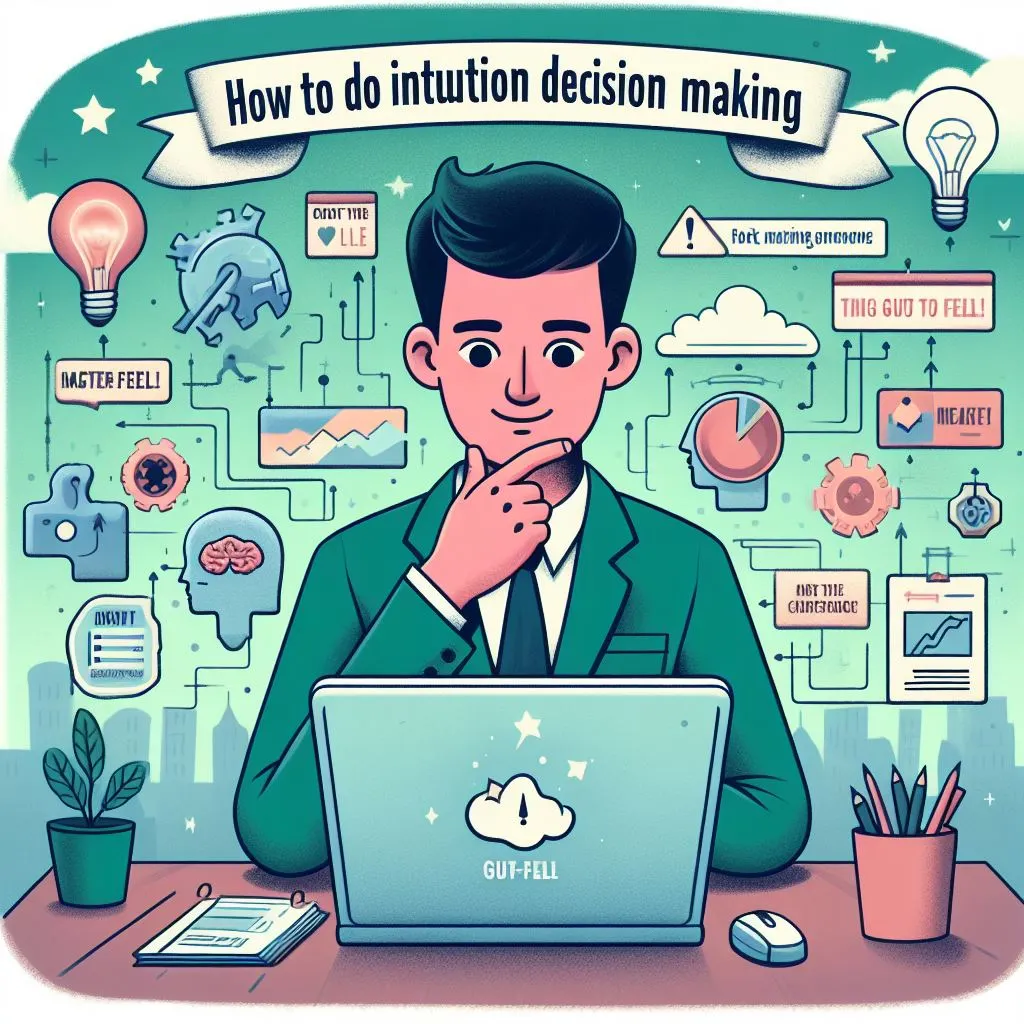
Efficient and effective, intuitive decision-making presents an alternative path to the conventional, overtly analytical approaches often advocated in strategic planning and problem-solving.
Unveiling Intuition In Decision Making
Unveiling Intuition in Decision Making is akin to peeling back the layers of a mysterious force within us. We make countless choices daily, often without pausing to consider the process behind them. Yet, beneath the surface lies a potent tool – our intuition. Recognizing and harnessing this inner voice can transform the way we navigate life’s crossroads.
The Science Behind Gut-feelings
Intuition, or ‘gut feeling’, isn’t just a fleeting whim; science suggests it’s a rapid-fire, unconscious form of cognitive processing. Emotional experiences are stored in our brain, creating a database our mind accesses when encountering new situations. This instantaneous retrieval of past learnings and patterns equips us with an ‘inner knowing’—a split-second response that guides our decisions.
- Neurological Basis: Brain scans show specific areas light up with intuitive thought.
- Instinct vs. Analysis: Unlike slow, methodical thinking, intuition strikes swiftly without detailed reasoning.
- Experience Matters: Greater life experiences can enrich one’s intuitive ability, honing this silent guide.
Differentiating Intuition From Impulse
Distinguishing between intuition and impulse is crucial for effective decision making. The impulse may resemble intuition but lacks its depth. Impulses are immediate reactions, often driven by our primitive desires or fears. In contrast, intuition is a more subtle nudge, informed by our internal wealth of knowledge and past encounters.
| Characteristic | Intuition | Impulse |
|---|---|---|
| Origin | Subconscious reasoning | Emotional reaction |
| Process | Reflective assessment | Instantaneous response |
| Outcome | Often positive, informed | Varies, can be regrettable |
To wield intuition wisely, consider its whisper and evaluate the impulse. Pause to discern the origin of your feelings. Reflect on past decisions that felt similar. Are they yielding a gentle guidance or a rash push? Learning this distinction lights the path to more aligned and mindful choice-making.
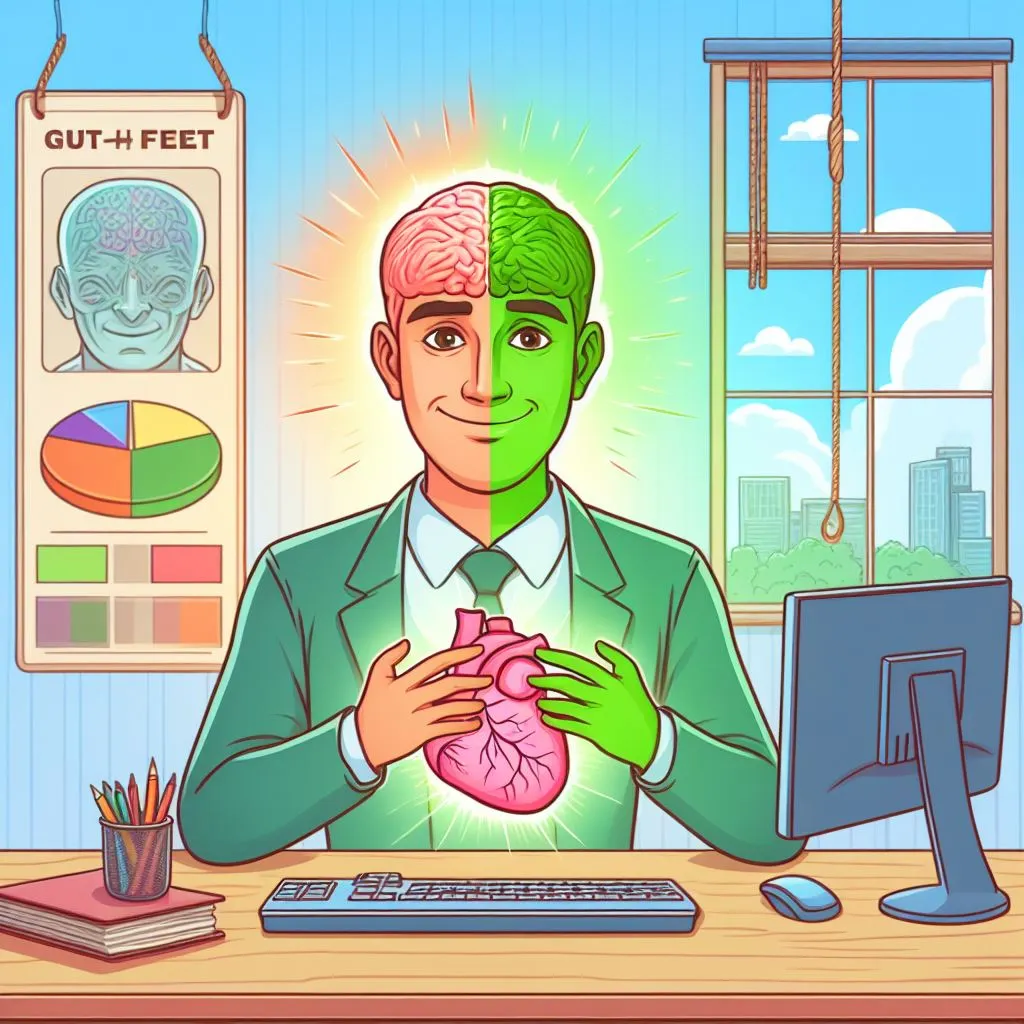
The Pivotal Role Of Intuition
Imagine driving a car without a steering wheel. Hard, right? That’s decision-making without intuition. In the complex journey of life, intuition acts as our inner steering wheel. It helps us navigate the road ahead, often beyond the reach of logic. Sometimes, the answer we seek lies within this powerful guide.
Historical Success Stories
Intuition has shaped destinies. Consider the apple that inspired Newton or the dream that led to the discovery of the benzene ring structure. History is rich with moments when a sudden insight changes everything. Intuition is that flicker in the mind, unlocking paths hidden from conscious thought.
Albert Einstein trusted his instincts, Steve Jobs embraced his hunches, And JK Rowling believed in her story-telling vision.
Intuition In The Digital Age
In this digital world, data drives decisions. Yet, there’s a limit to what numbers can narrate. Data informs but it’s intuition that transforms it into action. Tech leaders today still turn to their gut feelings when making pivotal choices. Artificial intelligence is on the rise, but it cannot replicate the human spark of intuition.
| Tech Innovation | Role of Intuition |
|---|---|
| Virtual Reality | Imagining the impossible |
| AI Development | Directing ethical considerations |
| UX Design | Understanding user emotions |
Honing Your Intuitive Skills
Honing your intuitive skills takes practice, patience, and a keen awareness of your inner voice. Intuition decision making isn’t about pulling answers out of thin air. It’s about tapping into the wisdom that you already have within you. Let’s dive into ways to recognize and enhance this powerful ability.
Recognizing Intuitive Signals
Your body often speaks your mind’s truth through subtle signs. Recognizing intuitive signals is the first step to better decision making. It might be a gut feeling, a sudden thought, or a sense of inner knowing. You’ll need to pay attention to:
- Physical sensations: A fluttering heart or a tight stomach can indicate intuition.
- Emotional responses: Feelings of comfort or discomfort can guide your choices.
- Recurring thoughts: Ideas that keep coming back to you might hold intuitive insights.
Meditation And Mindfulness Practices
To better connect with your intuition, engage in meditation and mindfulness practices. These techniques quiet the mind, allowing your intuitive voice to come through. Here’s how to get started:
- Find a quiet spot: A peaceful environment reduces distractions.
- Focus on your breath: This helps to bring your attention to the present moment.
- Allow thoughts to pass: Observe them without judgment and return your focus to your breath.
With regular practice, you can better sense and understand your intuition.
Mastering the art of intuition decision making is a journey. It strengthens with each step you take. Trust your process, and soon, you’ll find that your decisions come more naturally and feel right.
Balancing Logic And Intuition
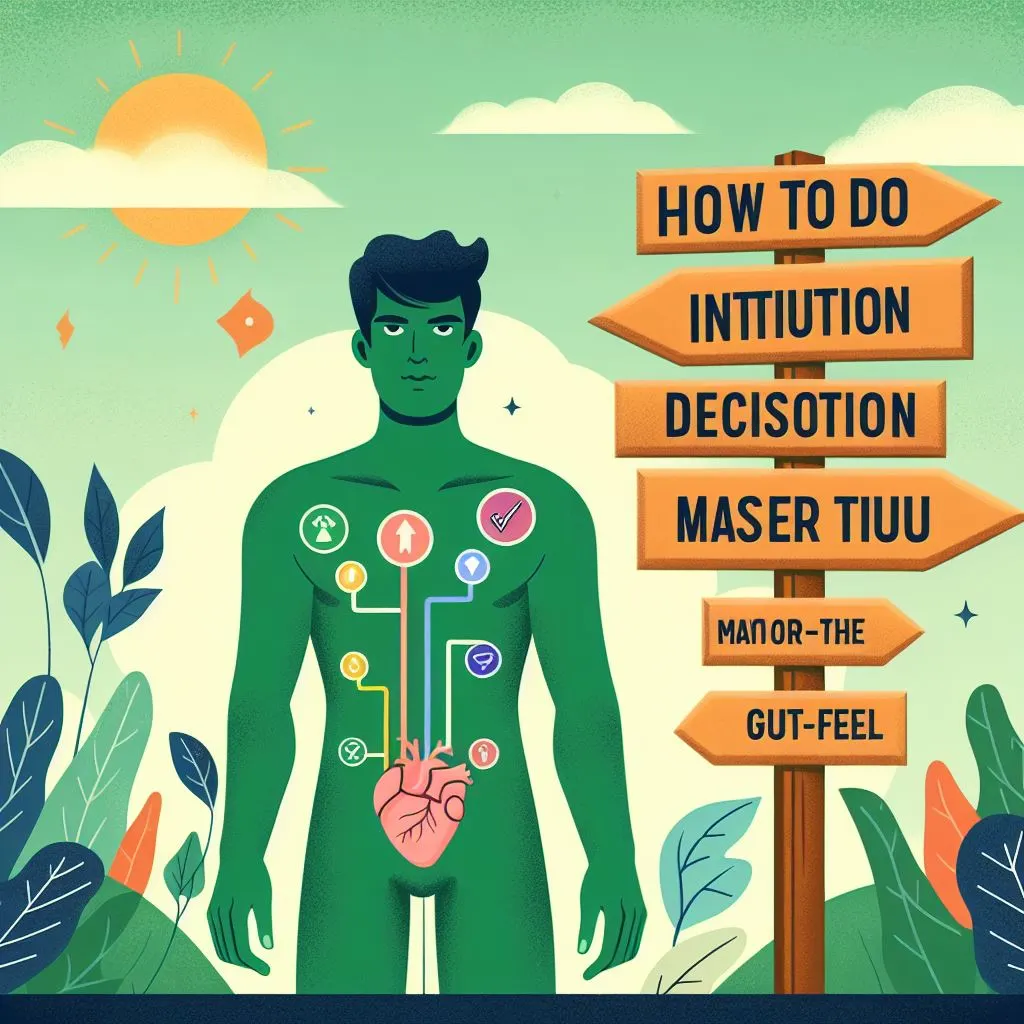
Balancing Logic and Intuition is like walking a tightrope in decision making. It requires harmony between your rational mind and instinctive feelings. The challenge lies in knowing when to let the facts dictate your next move and when to listen to that inner voice. Engage both these powerful tools to make well-rounded choices. Embrace the synergy of your mind and gut for superior outcomes.
Combining Analytical Thought With Gut Feeling
Integrating logic with instinct helps you make informed decisions. Here’s how:
- Gather facts and data to understand the problem thoroughly.
- Evaluate the information using analytical skills.
- Listen to your intuition for a sense of what feels right.
- Reflect on past experiences that might guide your choice.
- Seek a balance where both aspects converge.
Let your gut feeling influence the interpretation of your analysis. The blend leads to richer decision-making.
Avoiding Cognitive Biases
To make intuition more reliable, understand and circumvent cognitive biases:
| Bias Type | How to Avoid |
|---|---|
| Confirmation Bias | Seek out conflicting views and information. |
| Overconfidence Bias | Question your assumptions regularly. |
| Anchoring Bias | Keep an open mind, let new data shape views. |
| Emotion Bias | Wait until calm to decide. |
Being aware of these biases enhances the effectiveness of your intuitive decision making. Strive to achieve objectivity.
Developing Intuition Through Experience
Developing intuition through experience is like cultivating a garden; it needs time, patience, and care. Intuition is the secret ingredient in the recipe for successful decision-making. To sharpen this skill, one must not only rely on instinct but also build a solid foundation of learning and understanding from every decision made, big or small.
Learning From Past Decisions
They say hindsight is 20/20, and that’s especially true when it comes to intuition. Reflecting on past choices allows us to see patterns and outcomes.
- Keep a decision journal to track outcomes and feelings.
- Analyze decisions to understand what guided them.
- Identify successes and errors to guide future intuition.
Embracing Uncertainty And Risks
A leap of faith often accompanies an intuitive choice. Embrace the unknown by understanding that risk is a stepping stone to growth.
- Acknowledge fears but don’t let them control you.
- Consider probabilities but trust your gut.
- Small risks pave the way for bigger, more intuitive leaps.
Trusting Your Instincts In Professional Scenarios
Imagine standing at the crossroads of a major professional choice. The data seems overwhelming. Yet, something in your core nudges you toward a path less quantifiable. This is the art of trusting your instincts in professional scenarios. Tapping into that intuitive gut feeling isn’t mystical; it’s a powerful aspect of decision-making. Uncover how and when to embrace this skill in the business world below.
When To Rely On Gut Feeling In Business
Sometimes the spreadsheets, forecasts, and pros-and-cons lists only tell half the story. Here are situations when intuition can guide you:
- Quick Decisions: When time is scarce, trust your gut to lead.
- Sensing Discrepancies: If something feels off, investigate further.
- Assessing People: Intuition is key in hiring and partnerships.
Building Confidence In Your Intuition
Intuition is not a gift; it’s a skill you can improve. Build this expertise with these tips:
- Reflect on past decisions where your instinct was right.
- Start small and note outcomes when you trust your gut.
- Meditate to clear your mind and enhance inner awareness.
Enhancing Decision-making In Personal Life
Enhancing Decision-Making in Personal Life relies on the power of intuition. This gut feeling guides us when facts fall short. Trusting this inner voice can lead to clarity and confidence. Learning to harness it betters our personal decision-making journey. Let’s explore how to effectively use intuition in navigating relationships and making lifestyle choices.
Navigating Relationships With Intuition
Relationships require careful choices. Our gut feelings often pick up subtle signals that our rational mind misses. To make intuitive decisions within relationships, consider the following:
- Listen to your inner voice when meeting someone new.
- Reflect on past experiences without letting them cloud your judgment.
- A quick break from thinking helps your intuition speak.
- Notice physical gut reactions when around others.
- Seek quiet moments for your intuition to emerge.
Making Lifestyle Choices
Lifestyle choices shape our daily life. Intuition plays a key role here. It steers us towards what feels right. To enhance decision-making in lifestyle choices:
- Question which habits align with your core values.
- Imagine future scenarios with different choices and feel the outcome.
- Journal about the pros and cons, then sleep on it.
- Take note of recurring thoughts about changes you wish to make.
- Allow space for your intuition in a busy schedule.
Intuition And Leadership
In the world of leadership, intuition acts like a silent guide. It helps leaders make swift, yet impactful decisions. Intuition bridges the gap between what the data says and what the heart feels. Strong leaders often trust their gut instincts to carve out successful paths for their teams and organizations. They harness this inner voice to lead with confidence and inspire those around them to follow their lead.
Leading With An Intuitive Approach
Leading with intuition means listening closely to your inner voice. It’s about understanding the silent cues, in addition to the loud data. Leaders often face complex situations, and sometimes the data alone does not give the whole picture. Here, intuition kicks in. It draws from past experiences, emotions, and values. Let’s explore how an intuitive approach can make leaders different:
- Quick Decisions: Intuition helps in making decisions quickly without getting stuck in analysis.
- Enhanced Innovation: Intuition often leads to unexpected insights that result in new ideas.
- Confidence: Trusting your gut can boost confidence and decisiveness.
- Readiness: Leaders who are intuitive stay ready to pivot and adapt to changing circumstances.
Influencing Others Through Intuitive Decisions
Influencing others with intuitive decisions can be very powerful. Intuitive leaders not only make good choices for themselves but also empower their teams. They set an example that inspires others to tune into their intuition. This creates a more dynamic and agile team environment. Here are ways intuition can influence others:
| Effect on Team | Outcome |
|---|---|
| Trust Building | Teams trust leaders who make sound intuitive decisions. |
| Risk-taking | Teams learn to take calculated risks by following their leader’s example. |
| Morale Boost | Intuitive successes can boost team morale and motivation. |
| Empowerment | Teams feel empowered to use their intuition in decision-making. |
By leading with intuition and influencing others through intuitive decisions, leaders catalyze a culture of trust and innovation. An intuitive leader is like a lighthouse, guiding ships through the fog with a steady, unseen force. They light the path for their teams, showing that the realm beyond data is rich with possibility.
The Risks And Rewards Of Intuitive Decisions
Intuition can be a powerful guide in decision making. At times, it might lead to breakthroughs, while at others, it can result in missteps. Understanding the balance between its risks and rewards is crucial. Let’s explore both sides of intuitive decision making, with real-world examples to learn from.
Celebrated Cases Of Intuition Paying Off
Success stories abound where intuition led to outstanding outcomes.
- Steve Jobs famously trusted his gut to revolutionize the tech industry with Apple’s innovative products.
- In the medical field, Dr. Barry Marshall’s instincts pushed him to discover the bacterial cause of ulcers, defying conventional wisdom.
- Investor George Soros made bold moves based on his intuitive understanding of market dynamics, reaping substantial financial rewards.
These instances illuminate the powerful impact intuition can have when harnessed correctly.
Cautionary Tales Of Misguided Instincts
Not all gut feelings lead to success. Some can lead down perilous paths.
| Decision Maker | Misstep | Outcome |
|---|---|---|
| Blockbuster | Ignoring the potential of streaming services | Company bankruptcy |
| Nokia | Underestimating smartphone trends | Market share collapse |
| Kodak | Overlooking digital photography advancements | Drastic business decline |
These cases serve as reminders of the importance of critical thinking and data analysis alongside intuition.
Cultivating An Intuitive Environment
When thinking about intuition decision making, the environment plays a huge role. A well-crafted space encourages the mind to tap into its deepest resources. Let’s explore how to create places that nurture the intuitive spark within individuals and groups.
Fostering Intuition In Teams And Organizations
Encourage Open Dialogue. Teams should feel free to express ideas without fear. Leaders can create an atmosphere that values every team member’s input. Scheduled brainstorming sessions are key.
Embrace Diverse Perspectives. Teams with different backgrounds offer varied insights. This diversity can lead to rich, intuitive leaps. Recognize and celebrate this within your group.
Value Quiet Reflection. Provide time for team members to think alone. Solo brainstorming sessions before group discussions can prove fruitful. Some great ideas emerge in silence.
Offer training workshops. Teach your team about intuitive techniques. Workshops can help employees recognize and trust their gut feelings.
Creating Spaces For Intuition To Thrive
Design physical spaces that inspire. Spaces with natural light, plants, and comfortable seating can enhance intuitive thinking.
Minimize distractions. Quiet zones can help individuals focus on internal cues. Places that are tech-free allow for downtime, deep thought and intuition to surface.
Interactive areas. Encourage creativity with interactive boards or art installations. Spaces where ideas are visible can stimulate intuitive connections.
Personalize workspaces. Let team members arrange their own space. Personal touches allow individuality and comfort, fostering intuition.
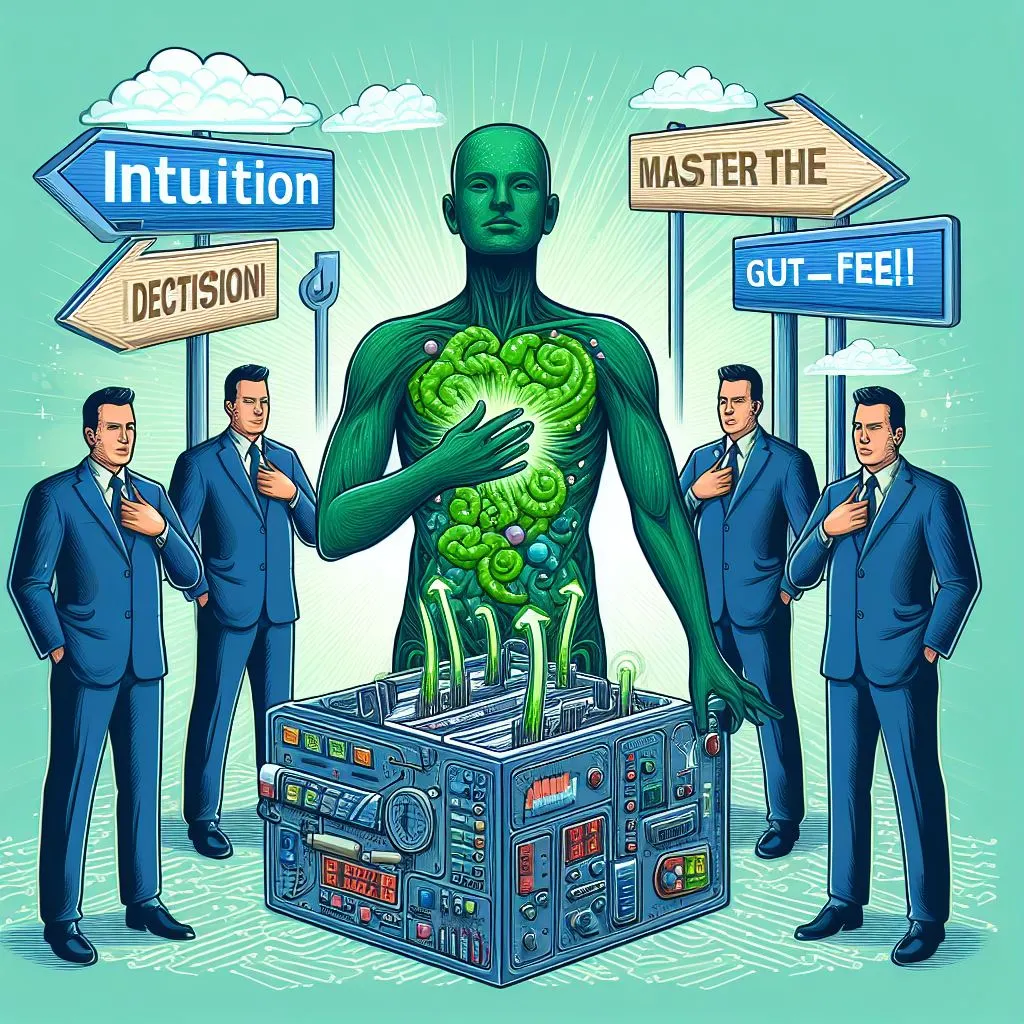
Future Perspectives On Intuition In Decision Making
The landscape of decision-making stands on the cusp of a new era. Intuition, long regarded as the elusive counterpart to rational analysis, is gaining a fresh perspective. As we look to the future, the way we understand and harness intuition in decision-making processes promises to evolve in unprecedented ways.
Can we anticipate how these changes will unfold? Indeed, two forefronts of development are showing promise: innovative research and the integration of intuition with artificial intelligence.
Innovative Research On The Horizon
Emerging studies are transforming the concept of intuitive decision-making from a mystical phenomenon into an observable science. Researchers are diving into cognitive science and neuroscience to unravel how the brain processes information unconsciously.
Through advanced brain imaging techniques and cognitive experiments, we can expect clear insights into how gut feelings and snap judgments are formed.
- Neurological pathways that trigger intuition are being mapped.
- Behavioral patterns are correlated with intuitive accuracy.
- Predictive models are developed to assess when intuition leads to successful outcomes.
Intuition In An Ai-powered World
Artificial intelligence is reshaping every aspect of our lives, including the role of intuition in decision-making. AI algorithms are beginning to mimic human-like intuition, opening doors to enhanced decision support systems.
As AI becomes more sophisticated, it may augment human intuition with data-driven insights, establishing a new synergy between human instinct and machine intelligence.
| AI Integration | Impact on Intuition |
|---|---|
| Machine learning | Enhances pattern recognition |
| Predictive analytics | Infuses data into ‘gut feelings’ |
| Neural networks | Simulates intuitive thought processes |
Together, these elements will likely forge a new decision-making paradigm, where intuition is both understood and amplified through technology. The questions concerning the collaboration of human and machine, ethical considerations, and the future of work in such an environment continue to provoke thought and research.
Frequently Asked Questions On How To Do Intuition Decision Making?
What Is Intuition Decision Making?
Intuition decision making involves using your gut feeling to make choices without relying heavily on analytical reasoning. It’s a subconscious process where you quickly draw on past experiences and personal values to guide you.
How Can I Improve My Intuitive Decision Making?
To improve intuitive decision making, frequently engage in reflective practices like journaling or meditation. This builds your ability to recognize and trust your gut feelings. Additionally, gaining diverse experiences enriches your intuition.
When Should I Trust My Gut Feeling?
Trust your gut feeling when you have to make decisions swiftly and when you have considerable experience in the related field. However, for complex or unfamiliar decisions, complement intuition with logical analysis.
What Are The Benefits Of Intuition In Decision Making?
Intuition can expedite the decision-making process and reduce stress. It allows you to make choices in sync with your core values and can often lead to creative and innovative outcomes when time is constrained.
Conclusion
Embracing intuition in decision-making can unlock new levels of insight. Trusting your gut augments data-driven strategies, leading to balanced choices. Start small, hone your instincts, and watch confidence in your inner voice grow. Remember, intuitive decisions can complement rational analysis, propelling you towards success with a more holistic approach.
Follow this path and discover the power of intuitive thinking in your life’s choices.

